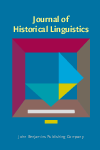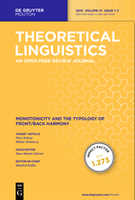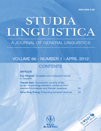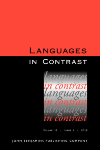
Yearbook of Phraseology
metrics 2024
Empowering Scholars with Cutting-Edge Phraseology Research
Introduction
The Yearbook of Phraseology, published by Walter de Gruyter GmbH, is an influential academic journal centered on the study of phraseology within the fields of linguistics and communication. With an ISSN of 1868-632X and an E-ISSN of 1868-6338, this journal showcases cutting-edge research from 2014 to 2023, emphasizing both theoretical and practical implications of phraseological studies. Notably ranking in the Q3 category for both Communication and Linguistics and Language, it holds a respectable position within the academic community, as indicated by its Scopus rankings which place it within the 63rd percentile for Language and Linguistics. The Yearbook of Phraseology serves as a vital resource for researchers, professionals, and students eager to explore the intricate relationships between language and communication through the lens of phraseology, making significant contributions to scholarly discourse in these dynamic fields.
Metrics 2024
 0.15
0.15 0.10
0.10 0.20
0.20 6
6Metrics History
Rank 2024
Scopus
JCI (Web Of Science)
Quartile History
Similar Journals

Acta Linguistica Academica
Advancing Knowledge in Linguistics and Literary TheoryActa Linguistica Academica is a distinguished academic journal published by Akademiai Kiado ZRT, located in Hungary. Since its inception in 2017, the journal has occupied a premier position in its field, achieving Q1 rankings in both Cultural Studies and Linguistics and Language, as well as in Literature and Literary Theory in 2023. With an impressive Scopus ranking placing it in the top percentiles across various categories, Acta Linguistica Academica stands out as a vital resource for researchers, professionals, and students dedicated to exploring the nuances of language, literature, and cultural dynamics. The journal provides a platform for high-quality research and diverse perspectives, facilitating the dissemination of innovative ideas and comprehensive analyses in these disciplines. As an esteemed open-access journal, it ensures that cutting-edge research is readily available to the academic community and the public at large, affirming its commitment to accessibility and knowledge sharing.

Journal of Historical Linguistics
Unraveling the Threads of Language EvolutionJournal of Historical Linguistics, published by JOHN BENJAMINS PUBLISHING CO, is an esteemed peer-reviewed journal that has carved a niche in the intricate field of linguistics and language. With its ISSN 2210-2116 and E-ISSN 2210-2124, the journal has made significant contributions since its inception in 2011, continuing its impactful discourse until 2024. Located in the Netherlands, the journal showcases a commitment to advancing our understanding of language evolution, change, and historical linguistics, providing invaluable insights for researchers, professionals, and students alike. As demonstrated by its commendable rankings—placing it in the Q3 quartile for linguistics and language with a Scopus rank of #275 out of 1088—this journal stands as a critical resource for those invested in the empirical and theoretical aspects of language history. Its accessibility enhances its reach, allowing for a wider distribution of knowledge in this vital scholarly area.

Language and Linguistics
Exploring the Frontiers of Language and ThoughtLanguage and Linguistics is a leading academic journal published by ACAD SINICA, INST LINGUISTICS, based in Taiwan. Established in 2008, this journal has rapidly gained recognition within the field of linguistics, achieving a commendable ranking of Q2 in the 2023 category quartiles and holding positions in the top percentiles of Scopus rankings for both Arts and Humanities and Social Sciences. With an ISSN of 1606-822X and an E-ISSN of 2309-5067, the journal aims to foster the development of linguistics research by providing a platform for the dissemination of innovative and interdisciplinary studies. While it currently operates on a traditional subscription model, its significant contribution to the advancement of linguistic theory and its applications makes it an invaluable resource for researchers, professionals, and students alike. Spanning converged years from 2008 to 2024, Language and Linguistics continues to shape the dialogue in understanding language phenomena and encourages submissions that push the boundaries of current linguistic knowledge.

Romanica Olomucensia
Cultivating a Global Community of Literary ScholarsRomanica Olomucensia is a distinguished open-access academic journal published by Palacky University, Department of Romance Philosophical Faculty in the Czech Republic. With its commitment to fostering advanced research in the fields of Literature and Literary Theory as well as Linguistics and Language, this journal aims to provide a platform for scholars, researchers, and students to share their findings and insights. Since its inception, Romanica Olomucensia has consistently been recognized for its quality, securing a position in the Q2 category in the literature domain and achieving a Q3 ranking in linguistics per the 2023 category quartiles. The journal is indexed in Scopus, reflecting its standing in the academic community, with impressive ranks in various arts and humanities disciplines. It has been an open-access journal since 2018, promoting unrestricted access to all its publications, thus enhancing global academic outreach. With a focus on innovation and interdisciplinary studies, Romanica Olomucensia serves as an essential resource for anyone interested in the dynamic interplay of language and literature.

LINGUISTICS AND PHILOSOPHY
Pioneering Research at the Intersection of Language and LogicLINGUISTICS AND PHILOSOPHY, published by Springer, is an esteemed peer-reviewed journal that serves as a vital interdisciplinary platform for scholars engaged in the intricate interplay between linguistic and philosophical inquiry. With a strong impact factor, this journal falls under the prestigious Q1 category in both Linguistics and Language and Philosophy, illustrating its significant contribution to these fields. The journal's scope encompasses a wide array of topics, including semantics, pragmatics, language theory, and the philosophical implications of linguistic theory, making it essential reading for researchers and professionals alike. Operating in the vibrant academic context of the Netherlands, LINGUISTICS AND PHILOSOPHY has maintained a vital connection to current trends in language studies and philosophical thought since its inception in 1977. With consistently high rankings in Scopus, the journal reflects its commitment to disseminating high-quality research that influences ongoing discussions in both disciplines. Even without Open Access options, its relevance and robust editorial standards continue to attract a global readership dedicated to advancing knowledge at the intersection of linguistics and philosophy.

THEORETICAL LINGUISTICS
Empowering Linguists with Cutting-Edge ResearchTHEORETICAL LINGUISTICS, published by Walter de Gruyter GmbH, is a prominent journal dedicated to exploring the intricate dimensions of linguistics, positioning itself as an essential resource for scholars and practitioners in the field. Established in 1974, this Germany-based journal has undergone significant evolution, contributing to the theoretical and empirical understanding of language with a focus on diverse linguistic phenomena. As evidenced by its Q2 ranking in the Linguistics and Language category for 2023, THEORETICAL LINGUISTICS engages with innovative theoretical discussions and methodologies, making it a vital platform for researchers navigating the complexities of language structure and usage. Though not an open-access journal, it ensures accessibility through robust distribution networks, fostering collaboration and knowledge-sharing within the academic community. With a consistent output from 1990 to 2024, this journal stands at the intersection of linguistics and language studies, appealing to a wide audience of researchers, professionals, and students alike.

CogniTextes
Advancing Linguistic Understanding, One Article at a Time.CogniTextes (ISSN: 1958-5322) is an esteemed open access journal published by the Association Française de Linguistique Cognitive, dedicated to the exploration of cognitive linguistics and its intersection with textual interpretation. Since its inception in 2007, CogniTextes has been a vital platform for disseminating cutting-edge research that delves into the cognitive processes underlying language use, enhancing our understanding of linguistics in a cognitive context. This journal not only fosters scholarly communication among researchers and professionals but also serves as a valuable resource for students keen on advancing their knowledge in cognitive linguistics. With its headquarters located at the University of Lille 3 in France, CogniTextes encourages contributions from a diverse spectrum of disciplines, thereby enriching the field of linguistics and cognitive studies. The journal's commitment to open access ensures that its findings are readily available to a global audience, thus facilitating knowledge sharing and academic discourse.

RUSSIAN LINGUISTICS
Advancing the frontiers of Russian language studies.RUSSIAN LINGUISTICS is a peer-reviewed academic journal published by Springer, dedicated to advancing the understanding of the Russian language and its interplay with various linguistic frameworks. With a longstanding history that spans from its inception in 1974, the journal encompasses a broad range of topics within the fields of linguistics and language studies, offering valuable insights especially in *Developmental and Educational Psychology* and the intricacies of linguistics at large. Currently ranked in the Q2 quartile for Linguistics and Language, and holding substantial positions within Scopus rankings, RUSSIAN LINGUISTICS serves as an essential resource for researchers, educators, and students alike, fostering dialogue and collaboration within the international linguistic community. The journal notably provides critical access to research findings that enhance the comprehension of Russian linguistics' role in a global context, despite operating under a traditional access model. For those pursuing scholarly excellence, RUSSIAN LINGUISTICS remains a pivotal platform for disseminating innovative research and promoting the study of language.

STUDIA LINGUISTICA
Navigating the Intersection of Language and PhilosophySTUDIA LINGUISTICA is a prestigious journal published by Wiley, focusing on the dynamic and multifaceted fields of Linguistics and Language. With an ISSN of 0039-3193 and an E-ISSN of 1467-9582, the journal has been a vital resource for academics since its inception in 1947, diligently converging insights from history and philosophy of science alongside contemporary linguistic research. Demonstrating excellent scholarly impact, STUDIA LINGUISTICA proudly holds a Q1 ranking in Linguistics and Language as well as a Q2 in History and Philosophy of Science as of 2023, indicating its significance within these academic domains. Furthermore, it ranks in the top percentiles among similar journals, with a commendable 73rd percentile in Language and Linguistics and 70th in related social sciences. Although it does not offer Open Access, its contribution to the discourse of language studies is underpinned by rigorous peer-review processes and commitment to advancing theoretical and empirical research. For researchers, professionals, and students alike, STUDIA LINGUISTICA remains an essential platform for disseminating impactful linguistic scholarship worldwide.

Languages in Contrast
Fostering Understanding Through Linguistic ExplorationLanguages in Contrast, a distinguished journal published by John Benjamins Publishing Co, serves as a vital platform in the field of linguistics, particularly focusing on the comparative study of languages. Operating under the ISSN 1387-6759 and E-ISSN 1569-9897, this journal has established its significance, achieving a commendable Q2 ranking in the 2023 Linguistics and Language category, indicative of its strong impact and reputation within the scientific community. With a Scopus ranking of #294 out of 1167, positioning it in the 74th percentile of its field, it consistently publishes high-quality research that explores the nuances and contrasting features of various languages, fostering deeper understanding and knowledge sharing among researchers, professionals, and students alike. While the journal is not open access, its rigorous peer-review process ensures that the contributions it includes are both insightful and groundbreaking, making it an invaluable resource for anyone invested in the study of languages. With coverage extending from 2008 to 2024, Languages in Contrast is poised to continue its pivotal role in advancing linguistic research and scholarship.